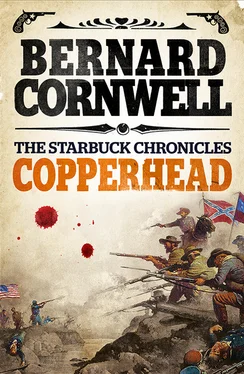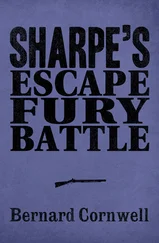Colonel Washington Faulconer, resplendent in an elegant Confederate uniform that was made even more dashing by the black sling supporting his right arm, congratulated the President, then went through the small fuss of not being able to shake hands with his wounded right arm and offering his left instead.
President Davis finally managed a limp, awkward handshake, then muttered that he was honored by Faulconer’s presence on this solemn occasion which was ushering in these days of heavy duty.
“Heavy duties call for great men, Mr. President,” Washington Faulconer responded, “which means we are fortunate indeed in you.”
Davis’s thin mouth twitched to acknowledge the compliment. He had a piercing headache that made him seem even more remote and cold than usual. “I do regret,” he said stiffly, “that you did not feel able to accept the duty of commissioner.”
“Though I certainly saved myself some inconvenience thereby, Mr. President,” Faulconer responded lightly, before realizing that in war all men were supposed to welcome inconvenience, even if that inconvenience did mean being kidnapped by the U.S. Navy from the comfortable staterooms of a British mail ship. The two commissioners had now been released, thus saving the North from battling the British as well as the Confederacy, but their arrival in Europe had not fetched good news. France would not support the South unless the British made the first move, and the British would not intervene unless the South gave clear signs of being able to win the war without outside help, which all added up to meaningless nonsense. The President, reflecting on the diplomatic failure, had concluded that the wrong men had been chosen as commissioners. Slidell and Mason were raw-mannered and blunt men, accustomed to the homespun texture of American politics, but hardly slippery enough for the sly chanceries of a suspicious Europe. A more elegant commissioner, the President now believed, might have achieved a greater success.
And Washington Faulconer was certainly an impressive man. He had flaxen hair and a frank, honest face that almost glowed with handsomeness. He had broad shoulders, a trim waist, and one of the greatest fortunes in all Virginia; a fortune so large that he had raised a regiment with his own money and then equipped it to a standard equal to the best in either army, and rumor claimed that he could have repeated that generosity a dozen times over and still not have felt the pinch. He was, by any man’s standard, a fortunate and striking man, and President Davis once again felt irritation that Faulconer had turned down diplomatic office to pursue his dream of leading a brigade into battle. “I’m sorry to see you’re not recovered, Faulconer.” The President gestured at the black sling.
“Some small loss of dexterity, Mr. President, but not sufficient to prevent me from wielding a sword in my country’s defense,” Faulconer said modestly, though in truth his arm was entirely mended and he wore the sling only to give an impression of heroism. The black sling was especially inspiring to women, an effect that was made more convenient by the absence from Richmond of Faulconer’s wife, who lived an invalid’s nervous existence on the family’s country estate. “And I trust the sword will be so employed soon,” Faulconer added in a heavy hint that he wanted the President’s support for his appointment as a brigadier.
“I suspect we shall all soon be fully employed in our various duties,” the cadaverous President answered vaguely. He wished his wife would come and help him deal with these eager people who wanted more enthusiasm than he felt able to give. Varina was so good with small talk, while on these social occasions the President felt the words shrivel on his tongue. Was Lincoln similarly afflicted by office seekers? Davis wondered. Or did his fellow President have a greater ease of manner with importunate strangers? A familiar face suddenly appeared beside Faulconer, a man who smiled and nodded at the President, demanding recognition. Davis scrabbled for the man’s name which, thankfully, came in the very nick of time. “Mr. Delaney,” the President greeted the newcomer unenthusiastically. Belvedere Delaney was a lawyer and gossip whom Davis did not remember inviting to this reception, but who had typically come anyway.
“Mr. President.” Delaney inclined his head in recognition of Jefferson’s high office. The Richmond lawyer was a small, plump, smiling man whose bland exterior concealed a mind as sharp as a serpent’s tooth. “Allow me to extend my sincere felicitations on your inauguration.”
“A solemn occasion, Delaney, leading to heavy duties.”
“As the weather seems to intimate, Mr. President,” Delaney said, appearing to take an unholy glee in the day’s damp character. “And now, sir, if I might, I have come to request Colonel Faulconer’s attention. You cannot monopolize the company of our Confederate heroes all day, sir.”
Davis nodded his grateful assent for Delaney to take Faulconer away, though the release only permitted a plump congressman to heartily congratulate his fellow Mississippian on being inaugurated as the Confederacy’s first President.
“It is a heavy duty and solemn responsibility,” the President murmured.
The Mississippi Congressman gave Jefferson Davis’s shoulder a mighty slap. “Heavy duty be damned, Jeff,” the Congressman bellowed in his President’s ear. “Just send our boys north to cut the nuts clean off old Abe Lincoln.”
“I must leave strategy to the generals.” The President tried to move the Congressman on and accept the more limpid good wishes of an Episcopalian clergyman instead.
“Hell, Jeff, you know as much ’bout war as any of our fine soldier boys.” The Congressman hawked a tobacco-rich gob toward a spittoon. The stream of brown spittle missed, spattering instead on the rain-soaked hoop skirt of the clergyman’s wife. “Time we settled those chicken-shit Yankees once and forever,” the Congressman opined happily, then offered the new President a pull on his flask. “Finest rot-skull whiskey this side of the Tennessee River, Jeff. One slug will cure whatever ails you!”
“You’re demanding my company, Delaney?” Faulconer was irritated that the short, sly lawyer had taken him away from the President.
“It ain’t me who wants you, Faulconer, but Daniels, and when Daniels calls, a man does best to respond,” Delaney said.
“Daniels!” Faulconer said in astonishment, for John Daniels was one of the most powerful and reclusive men in Richmond. He was also famously ugly and foulmouthed, but important because it was Daniels who decided what causes and men the powerful Richmond Examiner would support. He lived alone with two savage dogs that it was his pleasure to make fight while he cackled from the vantage point of a high barber’s chair. He was no mean fighter himself; he had twice faced his enemies on the Richmond dueling ground in Bloody Run and had survived both fights with his malevolent reputation enhanced. He was also regarded by many southerners as a first-rate political theorist, and his pamphlet, “The Nigger Question,” was widely admired by all those who saw no need to modify the institution of slavery. Now, it seemed, the formidable John Daniels waited for Faulconer on the elevated back porch of the new Executive Mansion where, horsewhip in hand, he stared moodily at the rain.
He gave Faulconer a sideways glance, then flicked his whip toward the water dripping off the bare trees. “Is this weather an augury for our new President, Faulconer?” Daniels asked in his grating, hard voice, eschewing any more formal greeting.
“I hope not, Daniels. You’re well, I trust?”
“And what do you think of our new President, Faulconer?” Daniels ignored Faulconer’s courtesy.
Читать дальше












